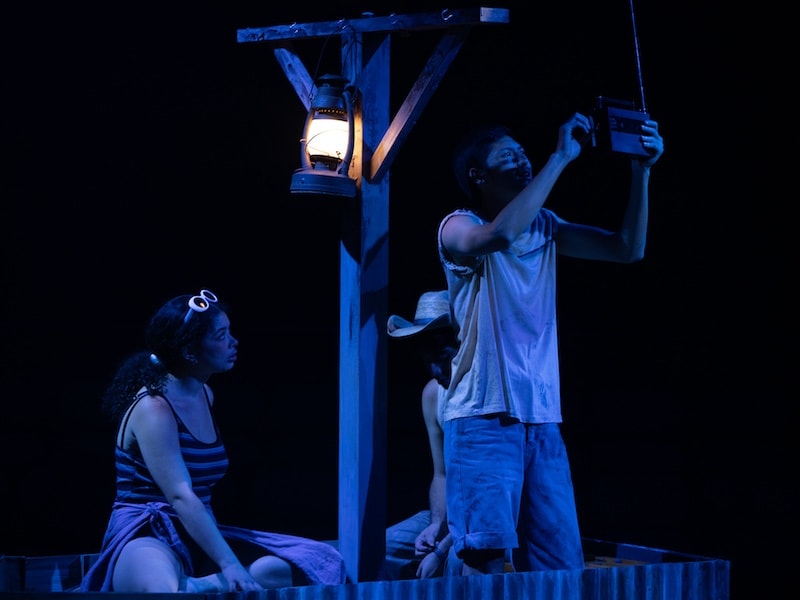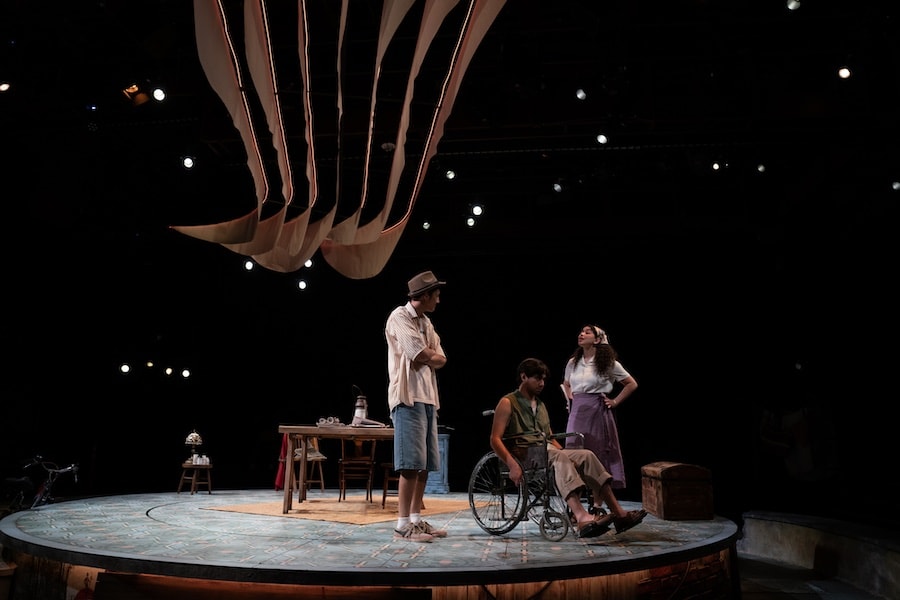Human beings are by nature political animals, says Aristotle. So, it should never have needed to be said that by nature, all politics is personal. In Nilo Cruz’s A Bicycle Country (being produced by the UMD School of Theatre, Dance, and Performance Studies in the Kogod Theatre at The Clarice Smith Performing Arts Center), the effects of political structures on the personal are at the center of the play, but so is beauty: Beauty in the midst of grief and disappointment and in the midst of the manipulation of personal lives at the hands of those in control of political structures.
The play takes place in Cuba during a time of deprivation brought on by the collapse of the Soviet Union (and the subsequent loss of subsidies that the Soviet Union supplied), which dovetailed with the continued embargo of Cuba by the United States. In a televised speech addressing the nation, Fidel Castro identified this as “a Special Period in a time of peace” — basically meaning that Cubans were living in a time when no bombs were being dropped or guns fired, but the economic pressures of war continued. Part of the response to this period of deprivation was the proliferation of bicycles (supplied by China at Cuba’s request) as the most accessible form of transportation around the country. Hence, the title of the piece, A Bicycle Country.

But to get back to the presence of beauty: Director Fatima Quander makes sure that beauty shares center stage with the deprivation brought on by political manipulation. In fact, the beauty overwhelms and comforts the audience and the characters during the entire first act. Interestingly, while there is beauty in the music (for example, the familiar “Guantanamera” makes an appearance), the music is a little restrained. We see the beauty more in the clothing (Becca Janney, costume designer) that identifies the characters immediately as Cuban: Pepe’s porkpie hat that echoes the relationship of Cuban music and jazz. Ines’ high-waisted skirts that exude a self-owned womanliness. Julio’s modest red guayabera and its self-assured masculinity. It’s also in the 360-degree circular design of the set (Sofia Olivar, scenic designer), with its graffiti, wooden slats, and tropical colors on bricks that protrude irregularly from the sides of the platform. The beauty continues in the similarly decorated low wall that surrounds the central performing space on which some fearless and flexible audience members can sit and imagine they are dangling their feet while spying on the intimate drama taking place behind those walls.
There is also beauty and comfort in the staging. For example, the sound of the rhythm of the bicycle bell that Pepe (Nelson Chen) rings each time he arrives to deliver the mail, and circumnavigates the space, riding between the audience members seated on the walls and those seated on chairs. There is the way the three cast members physically wind up in a triangular relationship with each other in the space over and over again, like skillfully placed chess pieces. There is deft beauty in Nilo Cruz’s words that express the strong desires the characters have to survive. Ines (Gracie Guzman) gives a birthday toast to Julio: “Next year … in another place,” simultaneously referring to and sidestepping the Jewish Passover toast of “Next year … in Jerusalem.” And maybe a final beauty in the familiarity of the whole setup of the first act.
In the opening scene, we see Pepe, who has been acting as a caregiver to Julio (Alex Diaz-Lopez). Julio has a physical injury that keeps him in a wheelchair most of the time. Pepe, who also delivers the daily mail, has convinced Ines to take on the job of caregiving to Julio. This is the first time Julio and Ines meet. Ines is adept at physical therapy and insistent on its implementation. Julio insists that Ines doesn’t understand the seriousness of his physical injury and refuses to do some of the things she asks. If you have ever seen a romantic movie comedy from the 1930s, you know this situation. The Fred Astairish/Humphrey Bogartish/Jimmy Stewartish immovable object (embodied by Julio) meets the Leslie Caronish/Lauren Bacallish/Grace Kellyish irresistible force (embodied by Ines). And the tug-of-war between them is overseen by the Walter Brennanish/Thelma Ritterish/Sancho Panzaish side-kick (embodied by Pepe). Despite the initial oppositional sparks that fly (Ines asks Pepe at one point: “What is this thing that he [Julio] has that won’t let him move forward?”), we know that Julio and Ines will fall in love. We know this story, we love it, and the fact that we can anticipate how things will go comforts us. But this is Cuba and the United States. So, there is a second act.

The second act is the exploration of what can happen to “the beautiful” when people who are poor decide they have to immigrate by any means necessary. The second act is horrific. And yet director Quander and playwright Cruz keep it beautiful through the horror. The stars are not seen in the skies but instead are reflected in the ocean that the trio is sailing on (Luis Garcia, lighting and projection design). The makeshift craft that the three have constructed magically — from the audience’s point of view — moves. At least onstage it moves. But the characters, none of whom have any experience in traveling by boat, are not sure which direction they are traveling or whether they are making any progress at all. And indeed, the audience may be so taken with the magic of the boat moving that they may not put 2 and 2 together and notice that if the onstage boat is moving in a circle, giving the audience the magical illusion of movement, this circular motion may not bode so well for Julio, Ines, and Pepe.
Lopez, Guzman, and Chen all give creditable verbal performances in their assigned roles. But they really shine in their physical expression of the roles. The actors fully embody these characters and their relationships. Some credit here must also go to movement coach Javier Padilla and intimacy director Jenny Male.
A Bicycle County is a beautiful gift to its audiences. It is full of surprise and magic, grief, comfort, and joy. And beauty runs throughout the whole blessed thing.
Running Time: Approximately two hours and 15 minutes with a 15-minute intermission.
A Bicycle Country plays on November 12, 2023, at 2:00 pm. and November 15 through November 17 at 7:30 pm presented by the UMD School of Theatre Dance and Performance Studies performing in the Kogod Theatre at The Clarice Smith Performing Arts Center, 8270 Alumni Drive, College Park, MD. Tickets (general public, $25; students and youth, $10) can be purchased online.
The program for A Bicycle Country is online here.
COVID Safety: Audience members are strongly encouraged, but not required, to attend performances masked. All patrons 12 years of age and older are strongly encouraged to be vaccinated and boosted but are not required to provide proof of vaccination or a negative COVID-19 test result for entry into the venue.
A Bicycle Country by Nilo Cruz
Directed by Fatima Quander
CAST
Julio: Alex Diaz-Lopez
Ines: Gracie Guzman
Pepe: Nelson Chen
Understudies:
Julio: Tito Silva
Ines: Kayla Harvey-Ali
Pepe: Cyrus Escalera
CREATIVE TEAM
Dramaturg: Katie Quinn
Movement Coach: Javier Padilla
Intimacy Director: Jenny Male
Scenic Designer: Sofia Olivar
Costume Designer: Becca Janney
Lighting & Projection Designer: Luis Garcia
Sound Designer: Justin Schmitz
Stage Manager: Mel Mader




